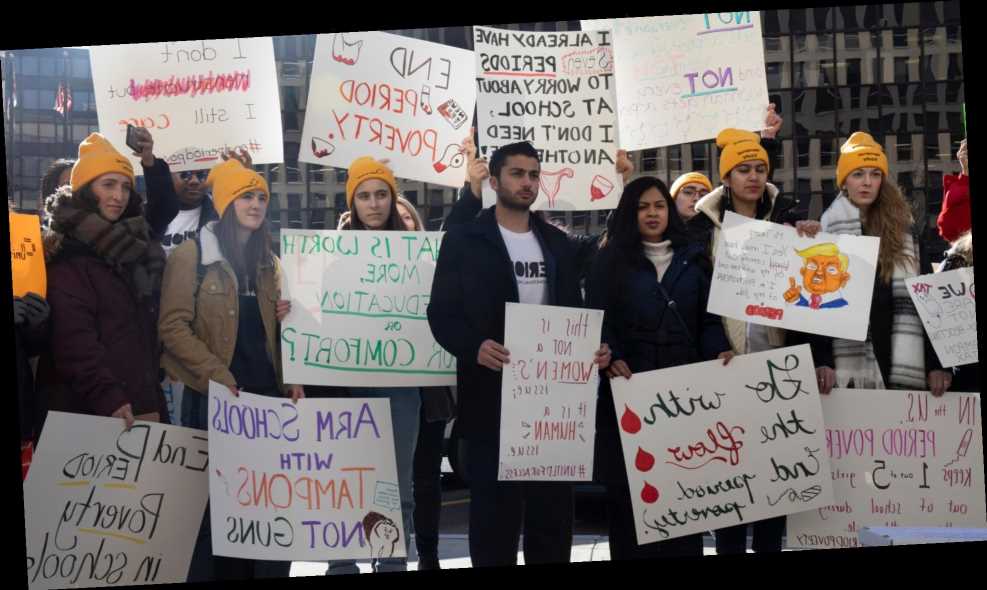Periods get a bad rap. They’re messy and uncomfortable — not to mention the butt of misogynistic (and cheap) jokes. Periods are more than a crummy punchline, though; they’re also something that half of the nation’s population deals with for an average of 40 years. And on Saturday, Oct. 19, thousands of people will gather in all 50 states for the first-ever National Period Day to fight for menstrual equity.
The nationwide rally, organized by Period, one of the nation’s largest youth-led NGOs, aims to break the stigmas surrounding periods and highlight the inequalities menstruators across all genders endure every single day. The average menstruator will spend thousands of dollars addressing their periods throughout their lifetime — some, including Ohio State Reps. Greta Johnson and Brigid Kelly, who sponsored legislation to end the “Pink Tax” in the state, estimate that the number could be as high as $11,000. The exorbitantly high cost includes money spent on menstrual hygiene products, the Tampon Tax (which is still an issue in 35 states), and period care products such as pain relievers. Many menstruators also have to factor in the cost of unpaid sick days due to debilitating pain or other menstrual-related reasons.
https://www.instagram.com/p/B3kVJzxn1EX/
Still, society doesn’t always like to talk about the bloody truth behind menstrual inequity, which is why Period and dozens of other groups, including Planned Parenthood, the Women’s March, and Seventh Generation, partnered for National Period Day.
“We realized that we have to change culture; show people that period poverty is a real issue and an urgent issue and one that people are going to mobilize around,” Nadya Okamoto, founder and executive director of Period, tells SheKnows. “So, that’s what we’re doing with National Period Day … we’re mobilizing rallies in all 50 states and major cities. It is with that goal of breaking the stigma around periods, elevating this conversation to a national level in a way that hasn’t been done before, and showing that people are literally rallying and calling for menstrual equity.”
But for Okamoto, a 21-year-old student at Harvard and author of Period Power: A Manifesto for the Menstrual Movement, menstrual equity goes beyond the Tampon Tax: it’s also about accessibility. As a teenager, Okamoto’s family experienced homelessness. During that time, she spoke to other homeless women and learned that many of them didn’t have access to menstruation products like tampons and pads and often used paper towels or cardboard as a replacement option.
Students suffer too. Nearly one in five kids misses school every year “because they did not have access to period products,” according to a 2018 Always Confidence & Puberty Survey.
These harsh realities inspired then-16-year-old Okamoto to found Period to break down societal stigmas and enact tangible change through policy activism and donations.
https://www.instagram.com/p/B3seHUzh6IY/
Now, Period has over 500 chapters in 50 states and 30 countries. Thanks to their efforts, these youth activists have pushed public schools to provide free menstruation products to students, exposed unfair state taxes, and served over 800,000 periods by donating menstrual products to schools, prisons, and shelters. Though the branches have accomplished a lot in five years, they’ve experienced their fair share of pushback. Unsurprisingly, one of the biggest challenges has centered around their youth.
“Now, youth activism is very common and very hyped up. [Climate activist] Greta [Thunberg], March for Our Lives, Climate Strike Students,” Okamoto says. “It’s so amazing to see how much more common it is. When we started, it was not like that. … No one took us seriously, and there weren’t actually other young activists in media that I could point to and be like, ‘Look what they did, that’s what we’re trying to do.’ There was a lot of ageism.”
The other challenges were more universal. Funding was hard to come by, and seemingly everyone from local donors to elected politicians had a hard time talking about periods. “As soon as we told [people] what we were doing, they would physically cringe and try to walk away,” Okamoto says. “Even some supporters didn’t want to publicly say that they supported us because they were embarrassed.” None of these obstacles prevented Okamoto and co-founder Vincent Forand from spreading their message; if anything, they just made the pair work harder. Over time, they found that framing their work “in the context of gender equality” resonated with a broader base.
“If you look at how gender equality is defined and the factors falling into these four buckets of education, health care, economic mobility, representation in politics and decision making, I can show and cite how period poverty and stigma are actively holding people back in all of those categories,” she says.
“I think when you put it in that context … and say, ‘How could you call yourself a feminist? If you believe [the menstruators] in your life deserve equal opportunity and confidence regardless of a natural need, then you inherently have to be a period warrior,” she adds.
National Period Day will mark the beginning of Period’s ramped-up efforts to address period poverty over the next year through lobbying, donations, and other organized events, such as PeriodCon, a two-day educational summit. While many of their upcoming efforts are located in the U.S., Okamoto says she remains committed to spreading her message worldwide.
“[Periods are] a beautiful equalizer,” she says, adding, “every person who has a uterus is probably going to menstruate for 40 years of their lives, and to have that shared understanding and experience [makes you realize] this movement is a global movement.”
Source: Read Full Article
